Sociology of Racism: Exploring Theories and Contemporary Issues
VerifiedAdded on 2022/09/06
|11
|2626
|17
Essay
AI Summary
This essay delves into the sociology of racism, examining its historical and contemporary manifestations. It explores various social theories, including the perspectives of Du Bois, Karl Marx, and Booker Washington, to understand the origins and evolution of racial discrimination. The essay analyzes the impact of colonialism, capitalism, and the role of institutions like the United Nations in shaping racial dynamics. It also investigates contemporary viewpoints, such as Eduardo Bonilla Silva's concept of color-blind racism. Through critical analysis of secondary sources, the essay highlights the pervasive nature of racism, its impact on individuals and society, and the importance of education and awareness in combating discrimination. The conclusion emphasizes the need for ongoing efforts to address racial inequalities and promote a more equitable society.
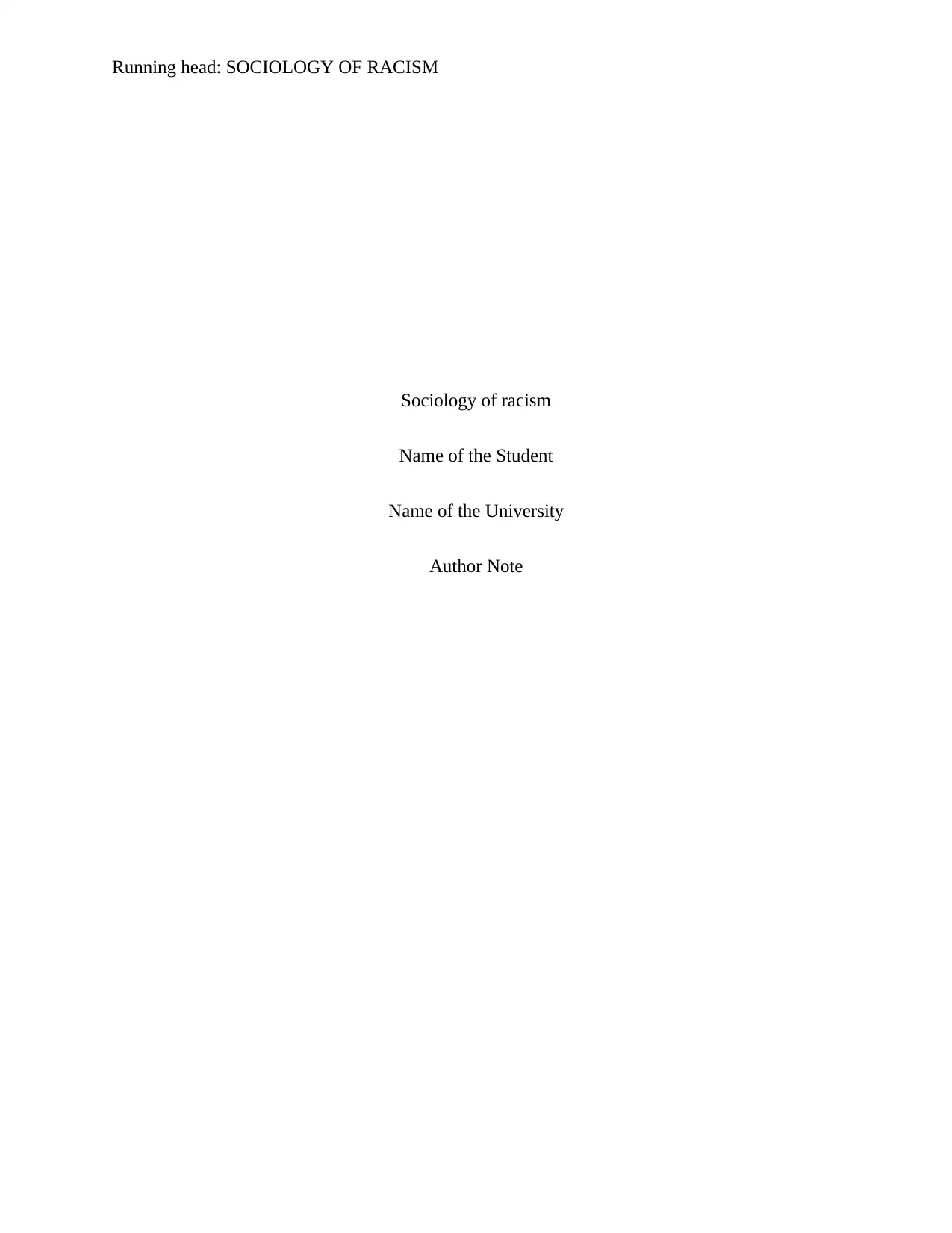
Running head: SOCIOLOGY OF RACISM
Sociology of racism
Name of the Student
Name of the University
Author Note
Sociology of racism
Name of the Student
Name of the University
Author Note
Paraphrase This Document
Need a fresh take? Get an instant paraphrase of this document with our AI Paraphraser
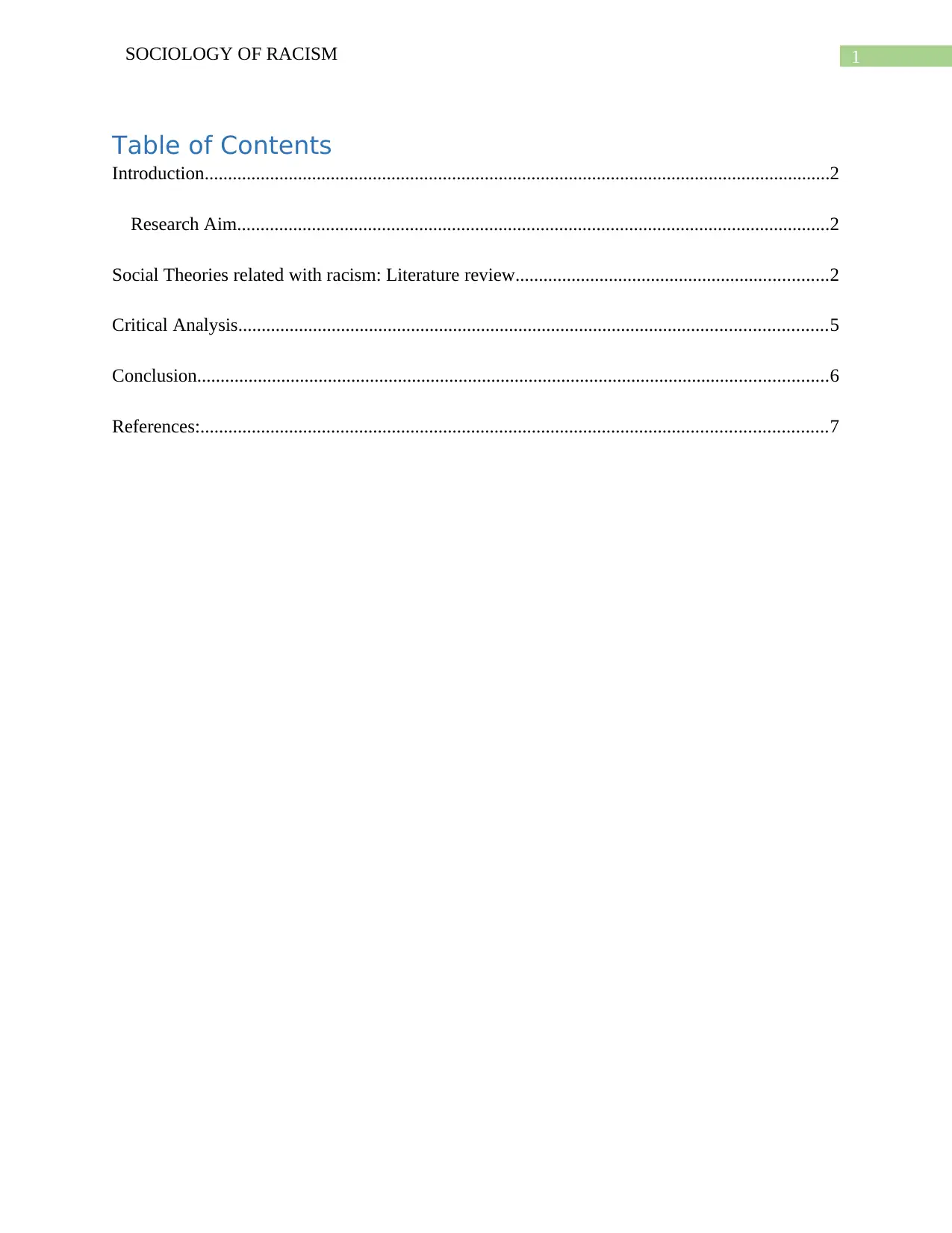
1SOCIOLOGY OF RACISM
Table of Contents
Introduction......................................................................................................................................2
Research Aim...............................................................................................................................2
Social Theories related with racism: Literature review...................................................................2
Critical Analysis..............................................................................................................................5
Conclusion.......................................................................................................................................6
References:......................................................................................................................................7
Table of Contents
Introduction......................................................................................................................................2
Research Aim...............................................................................................................................2
Social Theories related with racism: Literature review...................................................................2
Critical Analysis..............................................................................................................................5
Conclusion.......................................................................................................................................6
References:......................................................................................................................................7
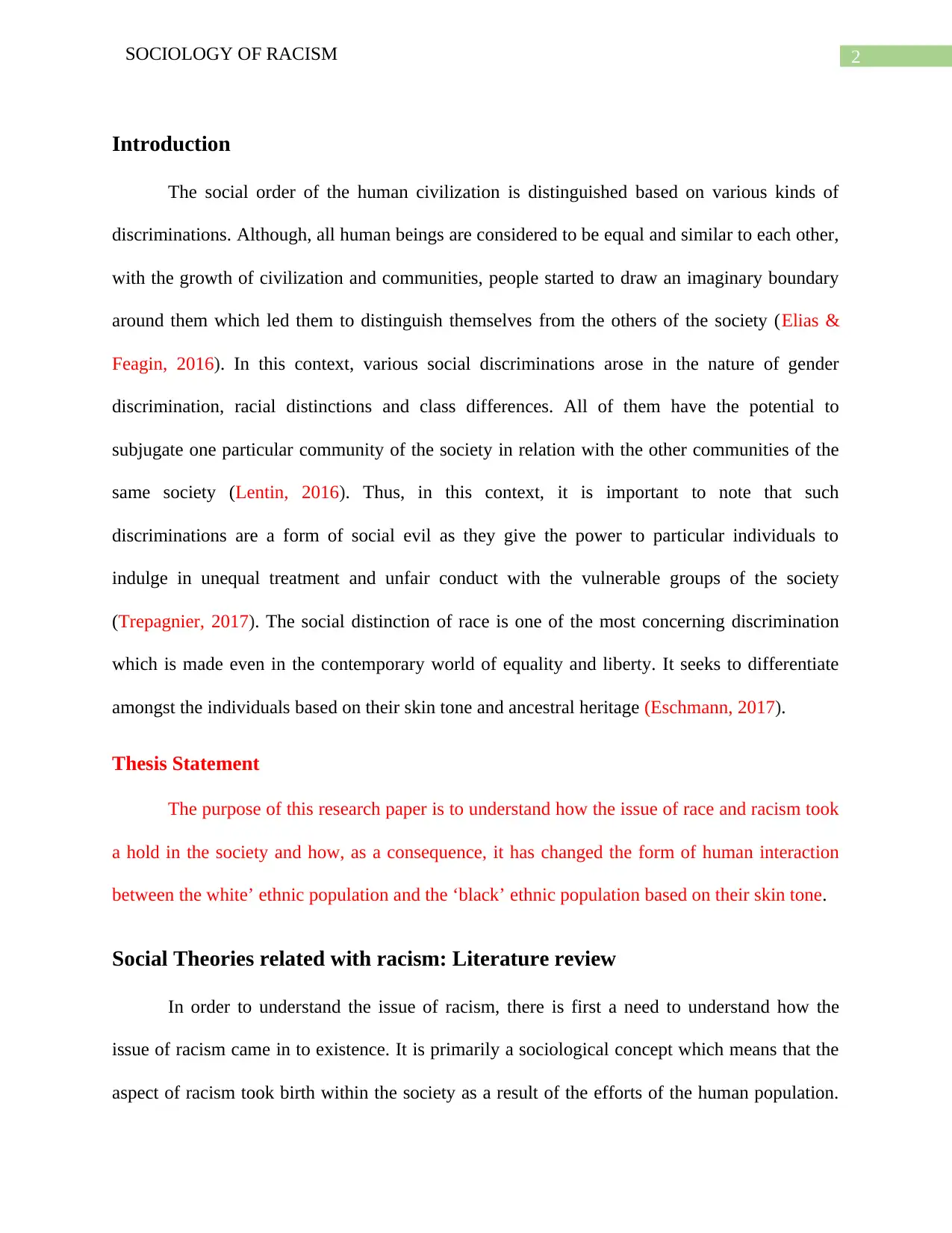
2SOCIOLOGY OF RACISM
Introduction
The social order of the human civilization is distinguished based on various kinds of
discriminations. Although, all human beings are considered to be equal and similar to each other,
with the growth of civilization and communities, people started to draw an imaginary boundary
around them which led them to distinguish themselves from the others of the society (Elias &
Feagin, 2016). In this context, various social discriminations arose in the nature of gender
discrimination, racial distinctions and class differences. All of them have the potential to
subjugate one particular community of the society in relation with the other communities of the
same society (Lentin, 2016). Thus, in this context, it is important to note that such
discriminations are a form of social evil as they give the power to particular individuals to
indulge in unequal treatment and unfair conduct with the vulnerable groups of the society
(Trepagnier, 2017). The social distinction of race is one of the most concerning discrimination
which is made even in the contemporary world of equality and liberty. It seeks to differentiate
amongst the individuals based on their skin tone and ancestral heritage (Eschmann, 2017).
Thesis Statement
The purpose of this research paper is to understand how the issue of race and racism took
a hold in the society and how, as a consequence, it has changed the form of human interaction
between the white’ ethnic population and the ‘black’ ethnic population based on their skin tone.
Social Theories related with racism: Literature review
In order to understand the issue of racism, there is first a need to understand how the
issue of racism came in to existence. It is primarily a sociological concept which means that the
aspect of racism took birth within the society as a result of the efforts of the human population.
Introduction
The social order of the human civilization is distinguished based on various kinds of
discriminations. Although, all human beings are considered to be equal and similar to each other,
with the growth of civilization and communities, people started to draw an imaginary boundary
around them which led them to distinguish themselves from the others of the society (Elias &
Feagin, 2016). In this context, various social discriminations arose in the nature of gender
discrimination, racial distinctions and class differences. All of them have the potential to
subjugate one particular community of the society in relation with the other communities of the
same society (Lentin, 2016). Thus, in this context, it is important to note that such
discriminations are a form of social evil as they give the power to particular individuals to
indulge in unequal treatment and unfair conduct with the vulnerable groups of the society
(Trepagnier, 2017). The social distinction of race is one of the most concerning discrimination
which is made even in the contemporary world of equality and liberty. It seeks to differentiate
amongst the individuals based on their skin tone and ancestral heritage (Eschmann, 2017).
Thesis Statement
The purpose of this research paper is to understand how the issue of race and racism took
a hold in the society and how, as a consequence, it has changed the form of human interaction
between the white’ ethnic population and the ‘black’ ethnic population based on their skin tone.
Social Theories related with racism: Literature review
In order to understand the issue of racism, there is first a need to understand how the
issue of racism came in to existence. It is primarily a sociological concept which means that the
aspect of racism took birth within the society as a result of the efforts of the human population.
⊘ This is a preview!⊘
Do you want full access?
Subscribe today to unlock all pages.

Trusted by 1+ million students worldwide
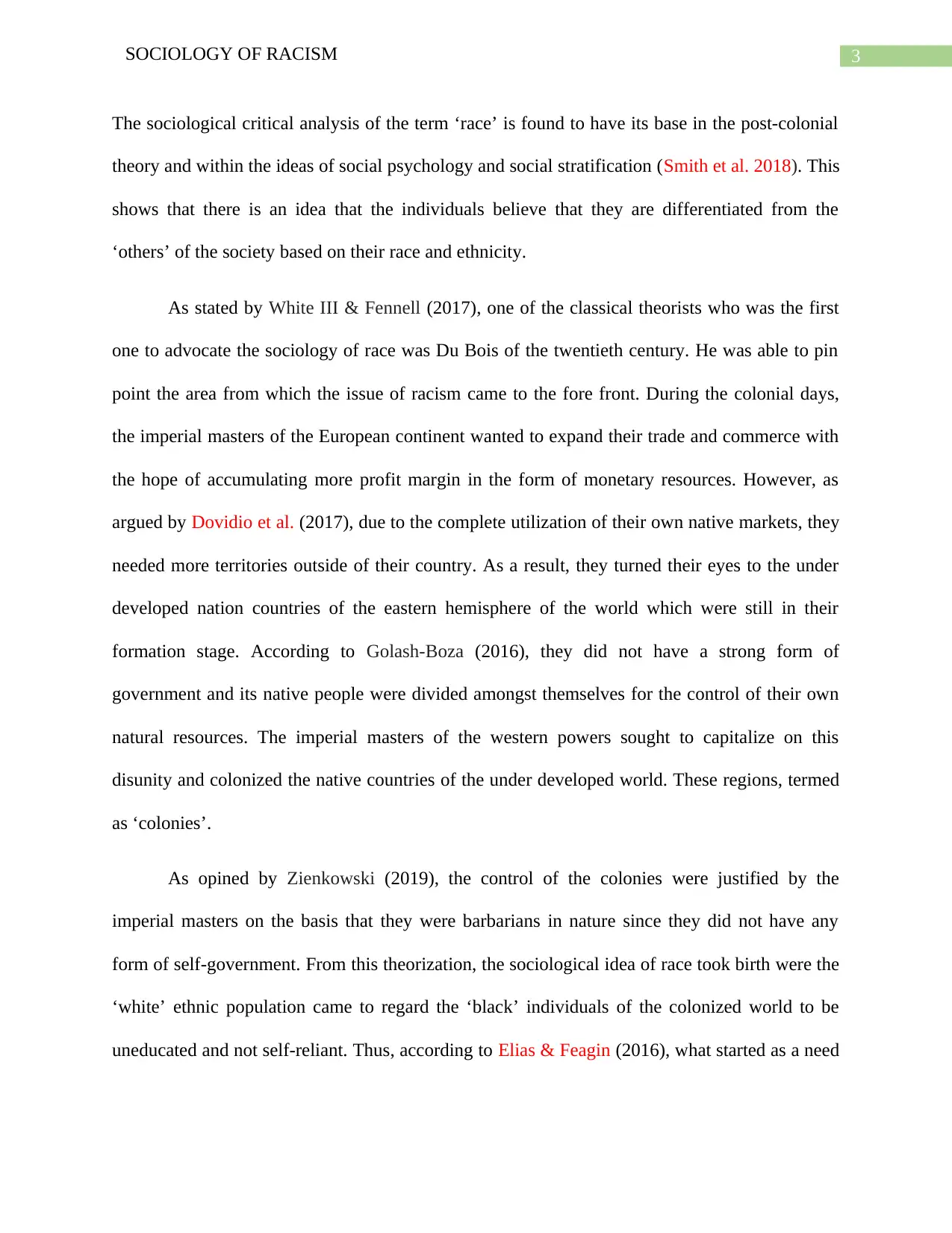
3SOCIOLOGY OF RACISM
The sociological critical analysis of the term ‘race’ is found to have its base in the post-colonial
theory and within the ideas of social psychology and social stratification (Smith et al. 2018). This
shows that there is an idea that the individuals believe that they are differentiated from the
‘others’ of the society based on their race and ethnicity.
As stated by White III & Fennell (2017), one of the classical theorists who was the first
one to advocate the sociology of race was Du Bois of the twentieth century. He was able to pin
point the area from which the issue of racism came to the fore front. During the colonial days,
the imperial masters of the European continent wanted to expand their trade and commerce with
the hope of accumulating more profit margin in the form of monetary resources. However, as
argued by Dovidio et al. (2017), due to the complete utilization of their own native markets, they
needed more territories outside of their country. As a result, they turned their eyes to the under
developed nation countries of the eastern hemisphere of the world which were still in their
formation stage. According to Golash-Boza (2016), they did not have a strong form of
government and its native people were divided amongst themselves for the control of their own
natural resources. The imperial masters of the western powers sought to capitalize on this
disunity and colonized the native countries of the under developed world. These regions, termed
as ‘colonies’.
As opined by Zienkowski (2019), the control of the colonies were justified by the
imperial masters on the basis that they were barbarians in nature since they did not have any
form of self-government. From this theorization, the sociological idea of race took birth were the
‘white’ ethnic population came to regard the ‘black’ individuals of the colonized world to be
uneducated and not self-reliant. Thus, according to Elias & Feagin (2016), what started as a need
The sociological critical analysis of the term ‘race’ is found to have its base in the post-colonial
theory and within the ideas of social psychology and social stratification (Smith et al. 2018). This
shows that there is an idea that the individuals believe that they are differentiated from the
‘others’ of the society based on their race and ethnicity.
As stated by White III & Fennell (2017), one of the classical theorists who was the first
one to advocate the sociology of race was Du Bois of the twentieth century. He was able to pin
point the area from which the issue of racism came to the fore front. During the colonial days,
the imperial masters of the European continent wanted to expand their trade and commerce with
the hope of accumulating more profit margin in the form of monetary resources. However, as
argued by Dovidio et al. (2017), due to the complete utilization of their own native markets, they
needed more territories outside of their country. As a result, they turned their eyes to the under
developed nation countries of the eastern hemisphere of the world which were still in their
formation stage. According to Golash-Boza (2016), they did not have a strong form of
government and its native people were divided amongst themselves for the control of their own
natural resources. The imperial masters of the western powers sought to capitalize on this
disunity and colonized the native countries of the under developed world. These regions, termed
as ‘colonies’.
As opined by Zienkowski (2019), the control of the colonies were justified by the
imperial masters on the basis that they were barbarians in nature since they did not have any
form of self-government. From this theorization, the sociological idea of race took birth were the
‘white’ ethnic population came to regard the ‘black’ individuals of the colonized world to be
uneducated and not self-reliant. Thus, according to Elias & Feagin (2016), what started as a need
Paraphrase This Document
Need a fresh take? Get an instant paraphrase of this document with our AI Paraphraser
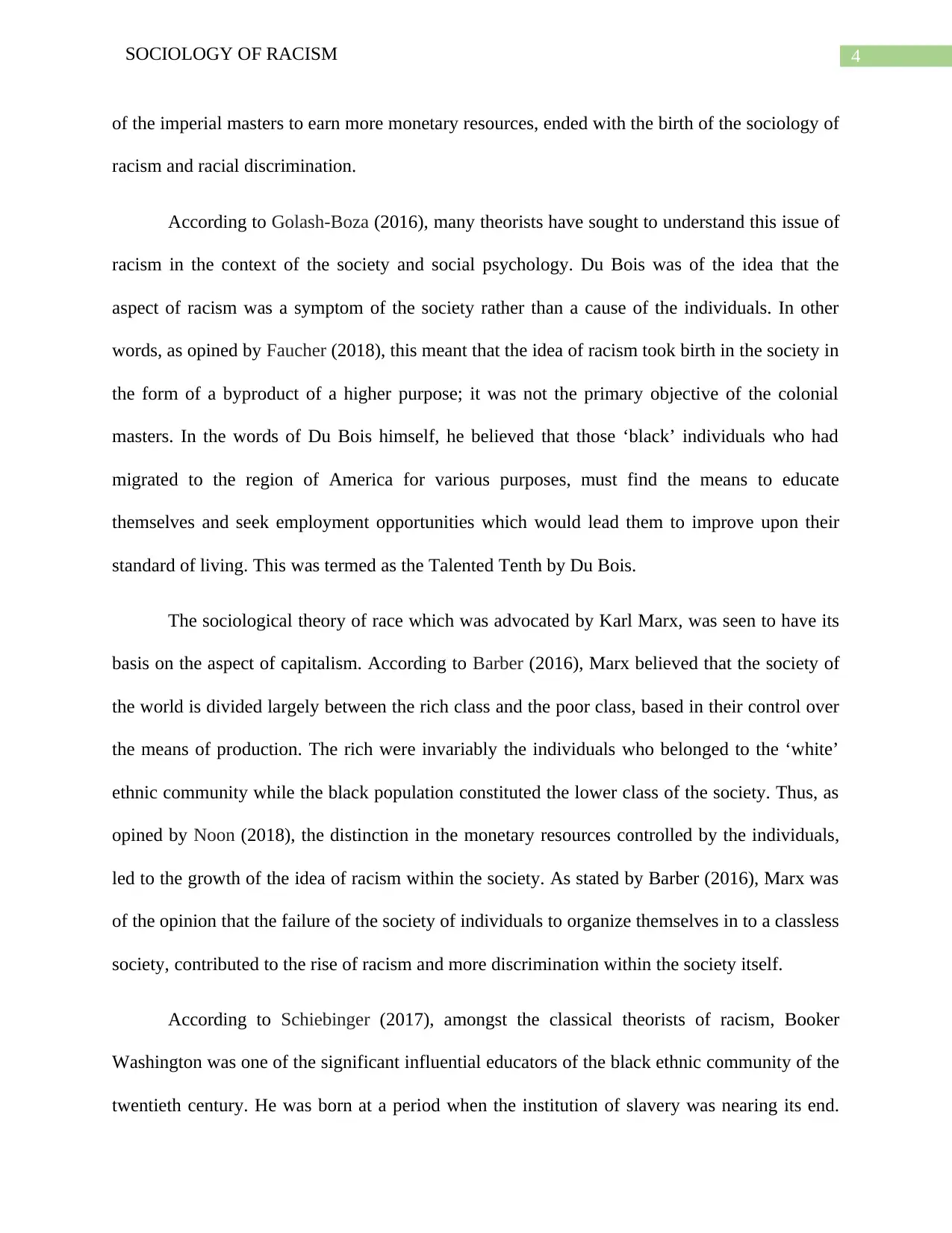
4SOCIOLOGY OF RACISM
of the imperial masters to earn more monetary resources, ended with the birth of the sociology of
racism and racial discrimination.
According to Golash-Boza (2016), many theorists have sought to understand this issue of
racism in the context of the society and social psychology. Du Bois was of the idea that the
aspect of racism was a symptom of the society rather than a cause of the individuals. In other
words, as opined by Faucher (2018), this meant that the idea of racism took birth in the society in
the form of a byproduct of a higher purpose; it was not the primary objective of the colonial
masters. In the words of Du Bois himself, he believed that those ‘black’ individuals who had
migrated to the region of America for various purposes, must find the means to educate
themselves and seek employment opportunities which would lead them to improve upon their
standard of living. This was termed as the Talented Tenth by Du Bois.
The sociological theory of race which was advocated by Karl Marx, was seen to have its
basis on the aspect of capitalism. According to Barber (2016), Marx believed that the society of
the world is divided largely between the rich class and the poor class, based in their control over
the means of production. The rich were invariably the individuals who belonged to the ‘white’
ethnic community while the black population constituted the lower class of the society. Thus, as
opined by Noon (2018), the distinction in the monetary resources controlled by the individuals,
led to the growth of the idea of racism within the society. As stated by Barber (2016), Marx was
of the opinion that the failure of the society of individuals to organize themselves in to a classless
society, contributed to the rise of racism and more discrimination within the society itself.
According to Schiebinger (2017), amongst the classical theorists of racism, Booker
Washington was one of the significant influential educators of the black ethnic community of the
twentieth century. He was born at a period when the institution of slavery was nearing its end.
of the imperial masters to earn more monetary resources, ended with the birth of the sociology of
racism and racial discrimination.
According to Golash-Boza (2016), many theorists have sought to understand this issue of
racism in the context of the society and social psychology. Du Bois was of the idea that the
aspect of racism was a symptom of the society rather than a cause of the individuals. In other
words, as opined by Faucher (2018), this meant that the idea of racism took birth in the society in
the form of a byproduct of a higher purpose; it was not the primary objective of the colonial
masters. In the words of Du Bois himself, he believed that those ‘black’ individuals who had
migrated to the region of America for various purposes, must find the means to educate
themselves and seek employment opportunities which would lead them to improve upon their
standard of living. This was termed as the Talented Tenth by Du Bois.
The sociological theory of race which was advocated by Karl Marx, was seen to have its
basis on the aspect of capitalism. According to Barber (2016), Marx believed that the society of
the world is divided largely between the rich class and the poor class, based in their control over
the means of production. The rich were invariably the individuals who belonged to the ‘white’
ethnic community while the black population constituted the lower class of the society. Thus, as
opined by Noon (2018), the distinction in the monetary resources controlled by the individuals,
led to the growth of the idea of racism within the society. As stated by Barber (2016), Marx was
of the opinion that the failure of the society of individuals to organize themselves in to a classless
society, contributed to the rise of racism and more discrimination within the society itself.
According to Schiebinger (2017), amongst the classical theorists of racism, Booker
Washington was one of the significant influential educators of the black ethnic community of the
twentieth century. He was born at a period when the institution of slavery was nearing its end.
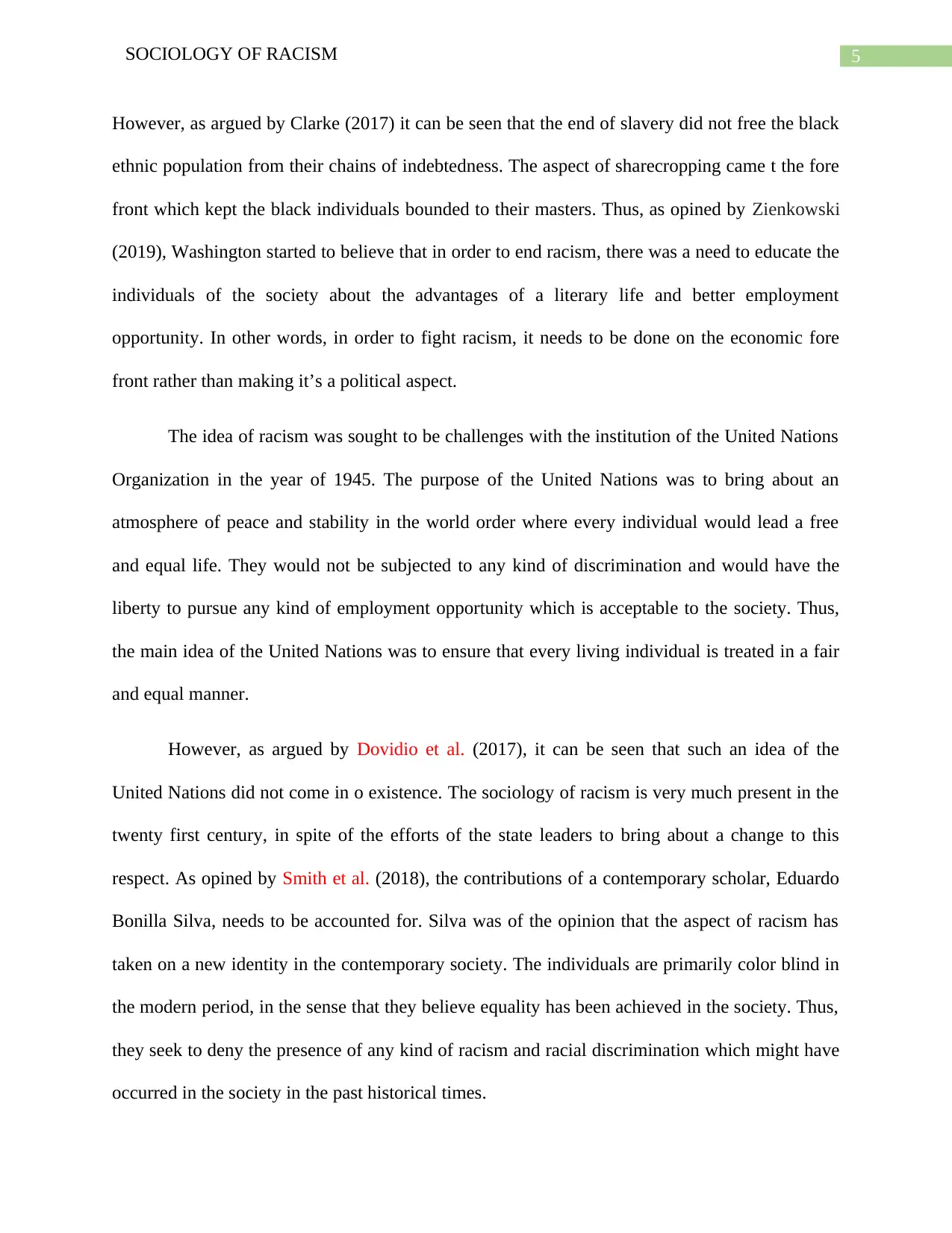
5SOCIOLOGY OF RACISM
However, as argued by Clarke (2017) it can be seen that the end of slavery did not free the black
ethnic population from their chains of indebtedness. The aspect of sharecropping came t the fore
front which kept the black individuals bounded to their masters. Thus, as opined by Zienkowski
(2019), Washington started to believe that in order to end racism, there was a need to educate the
individuals of the society about the advantages of a literary life and better employment
opportunity. In other words, in order to fight racism, it needs to be done on the economic fore
front rather than making it’s a political aspect.
The idea of racism was sought to be challenges with the institution of the United Nations
Organization in the year of 1945. The purpose of the United Nations was to bring about an
atmosphere of peace and stability in the world order where every individual would lead a free
and equal life. They would not be subjected to any kind of discrimination and would have the
liberty to pursue any kind of employment opportunity which is acceptable to the society. Thus,
the main idea of the United Nations was to ensure that every living individual is treated in a fair
and equal manner.
However, as argued by Dovidio et al. (2017), it can be seen that such an idea of the
United Nations did not come in o existence. The sociology of racism is very much present in the
twenty first century, in spite of the efforts of the state leaders to bring about a change to this
respect. As opined by Smith et al. (2018), the contributions of a contemporary scholar, Eduardo
Bonilla Silva, needs to be accounted for. Silva was of the opinion that the aspect of racism has
taken on a new identity in the contemporary society. The individuals are primarily color blind in
the modern period, in the sense that they believe equality has been achieved in the society. Thus,
they seek to deny the presence of any kind of racism and racial discrimination which might have
occurred in the society in the past historical times.
However, as argued by Clarke (2017) it can be seen that the end of slavery did not free the black
ethnic population from their chains of indebtedness. The aspect of sharecropping came t the fore
front which kept the black individuals bounded to their masters. Thus, as opined by Zienkowski
(2019), Washington started to believe that in order to end racism, there was a need to educate the
individuals of the society about the advantages of a literary life and better employment
opportunity. In other words, in order to fight racism, it needs to be done on the economic fore
front rather than making it’s a political aspect.
The idea of racism was sought to be challenges with the institution of the United Nations
Organization in the year of 1945. The purpose of the United Nations was to bring about an
atmosphere of peace and stability in the world order where every individual would lead a free
and equal life. They would not be subjected to any kind of discrimination and would have the
liberty to pursue any kind of employment opportunity which is acceptable to the society. Thus,
the main idea of the United Nations was to ensure that every living individual is treated in a fair
and equal manner.
However, as argued by Dovidio et al. (2017), it can be seen that such an idea of the
United Nations did not come in o existence. The sociology of racism is very much present in the
twenty first century, in spite of the efforts of the state leaders to bring about a change to this
respect. As opined by Smith et al. (2018), the contributions of a contemporary scholar, Eduardo
Bonilla Silva, needs to be accounted for. Silva was of the opinion that the aspect of racism has
taken on a new identity in the contemporary society. The individuals are primarily color blind in
the modern period, in the sense that they believe equality has been achieved in the society. Thus,
they seek to deny the presence of any kind of racism and racial discrimination which might have
occurred in the society in the past historical times.
⊘ This is a preview!⊘
Do you want full access?
Subscribe today to unlock all pages.

Trusted by 1+ million students worldwide
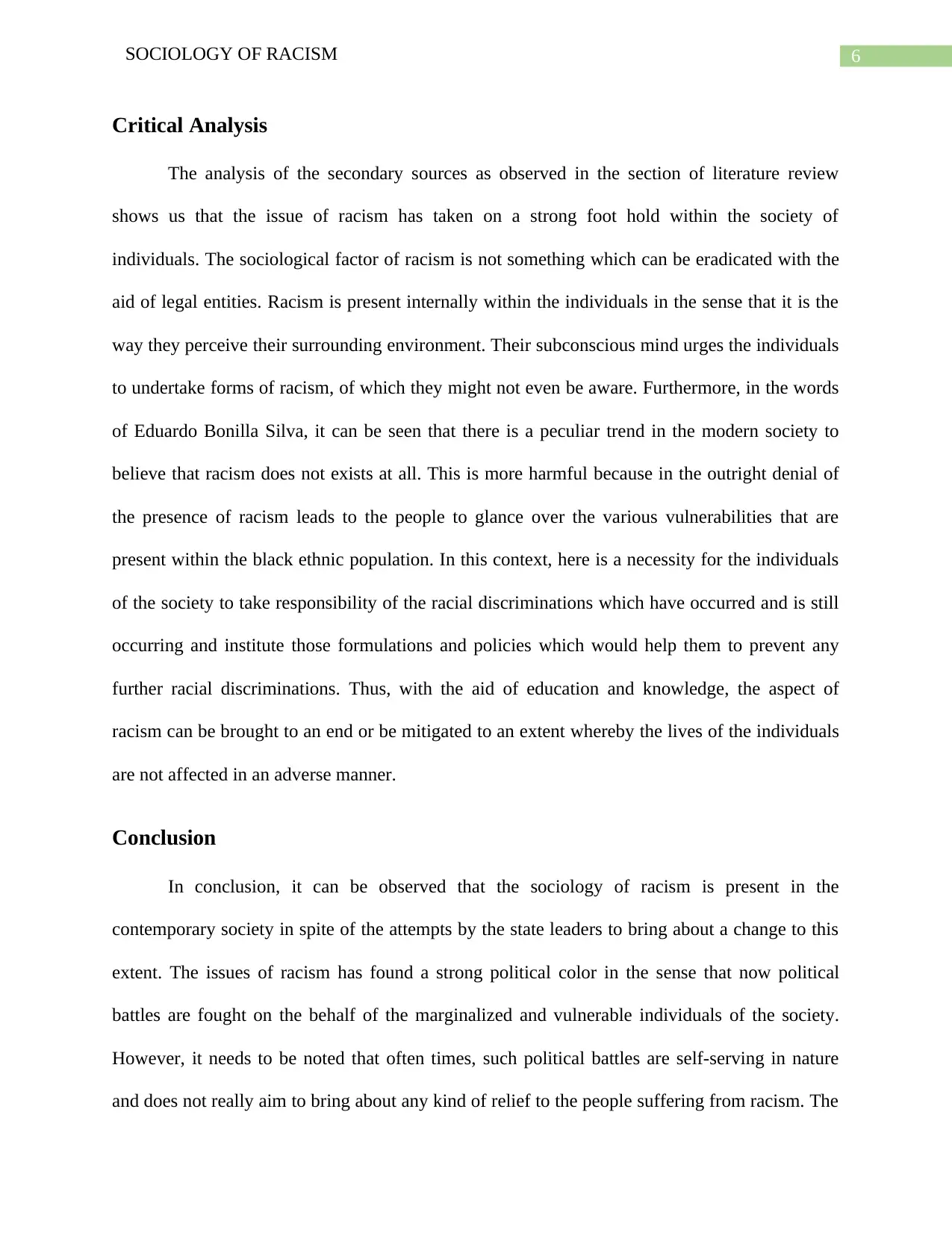
6SOCIOLOGY OF RACISM
Critical Analysis
The analysis of the secondary sources as observed in the section of literature review
shows us that the issue of racism has taken on a strong foot hold within the society of
individuals. The sociological factor of racism is not something which can be eradicated with the
aid of legal entities. Racism is present internally within the individuals in the sense that it is the
way they perceive their surrounding environment. Their subconscious mind urges the individuals
to undertake forms of racism, of which they might not even be aware. Furthermore, in the words
of Eduardo Bonilla Silva, it can be seen that there is a peculiar trend in the modern society to
believe that racism does not exists at all. This is more harmful because in the outright denial of
the presence of racism leads to the people to glance over the various vulnerabilities that are
present within the black ethnic population. In this context, here is a necessity for the individuals
of the society to take responsibility of the racial discriminations which have occurred and is still
occurring and institute those formulations and policies which would help them to prevent any
further racial discriminations. Thus, with the aid of education and knowledge, the aspect of
racism can be brought to an end or be mitigated to an extent whereby the lives of the individuals
are not affected in an adverse manner.
Conclusion
In conclusion, it can be observed that the sociology of racism is present in the
contemporary society in spite of the attempts by the state leaders to bring about a change to this
extent. The issues of racism has found a strong political color in the sense that now political
battles are fought on the behalf of the marginalized and vulnerable individuals of the society.
However, it needs to be noted that often times, such political battles are self-serving in nature
and does not really aim to bring about any kind of relief to the people suffering from racism. The
Critical Analysis
The analysis of the secondary sources as observed in the section of literature review
shows us that the issue of racism has taken on a strong foot hold within the society of
individuals. The sociological factor of racism is not something which can be eradicated with the
aid of legal entities. Racism is present internally within the individuals in the sense that it is the
way they perceive their surrounding environment. Their subconscious mind urges the individuals
to undertake forms of racism, of which they might not even be aware. Furthermore, in the words
of Eduardo Bonilla Silva, it can be seen that there is a peculiar trend in the modern society to
believe that racism does not exists at all. This is more harmful because in the outright denial of
the presence of racism leads to the people to glance over the various vulnerabilities that are
present within the black ethnic population. In this context, here is a necessity for the individuals
of the society to take responsibility of the racial discriminations which have occurred and is still
occurring and institute those formulations and policies which would help them to prevent any
further racial discriminations. Thus, with the aid of education and knowledge, the aspect of
racism can be brought to an end or be mitigated to an extent whereby the lives of the individuals
are not affected in an adverse manner.
Conclusion
In conclusion, it can be observed that the sociology of racism is present in the
contemporary society in spite of the attempts by the state leaders to bring about a change to this
extent. The issues of racism has found a strong political color in the sense that now political
battles are fought on the behalf of the marginalized and vulnerable individuals of the society.
However, it needs to be noted that often times, such political battles are self-serving in nature
and does not really aim to bring about any kind of relief to the people suffering from racism. The
Paraphrase This Document
Need a fresh take? Get an instant paraphrase of this document with our AI Paraphraser
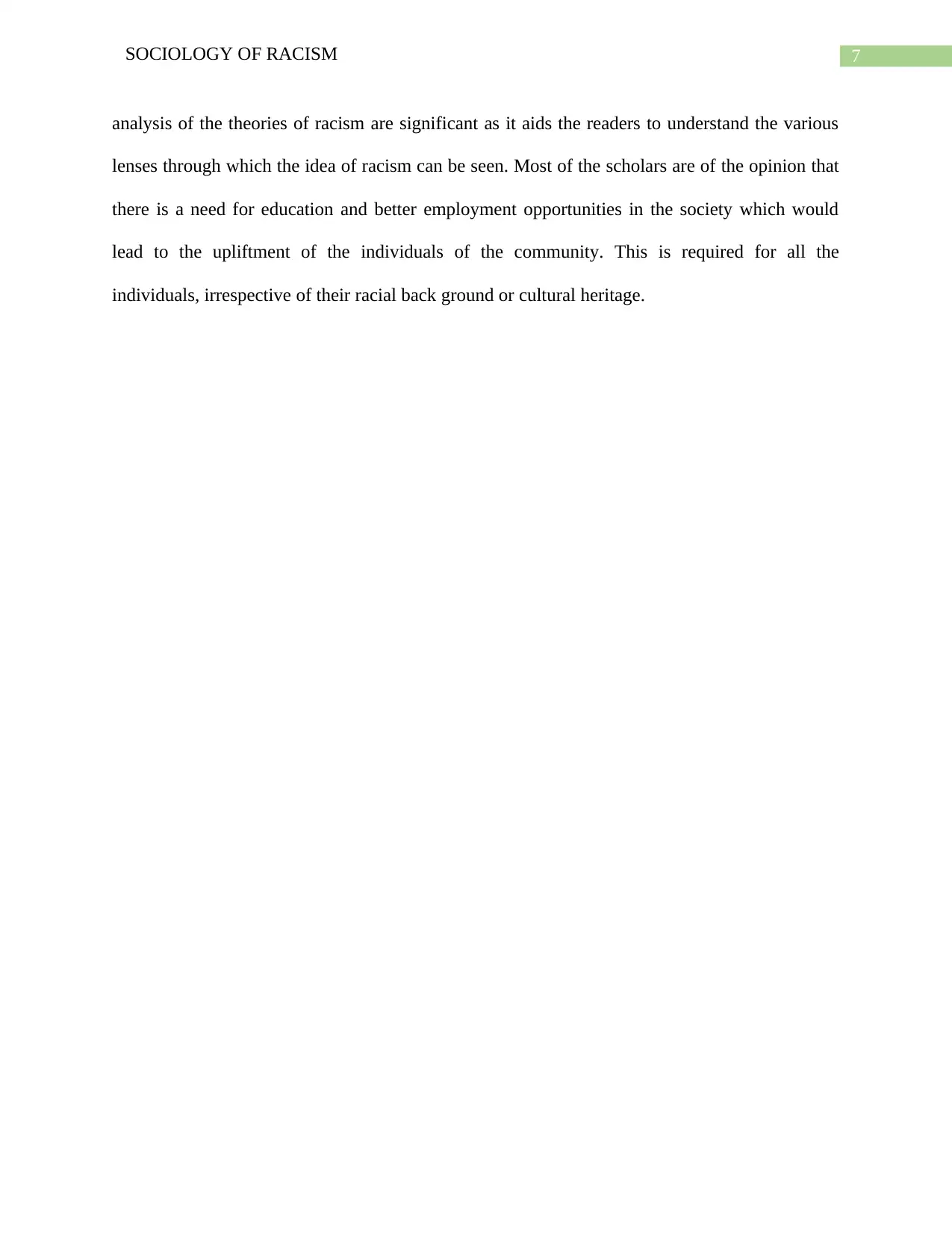
7SOCIOLOGY OF RACISM
analysis of the theories of racism are significant as it aids the readers to understand the various
lenses through which the idea of racism can be seen. Most of the scholars are of the opinion that
there is a need for education and better employment opportunities in the society which would
lead to the upliftment of the individuals of the community. This is required for all the
individuals, irrespective of their racial back ground or cultural heritage.
analysis of the theories of racism are significant as it aids the readers to understand the various
lenses through which the idea of racism can be seen. Most of the scholars are of the opinion that
there is a need for education and better employment opportunities in the society which would
lead to the upliftment of the individuals of the community. This is required for all the
individuals, irrespective of their racial back ground or cultural heritage.
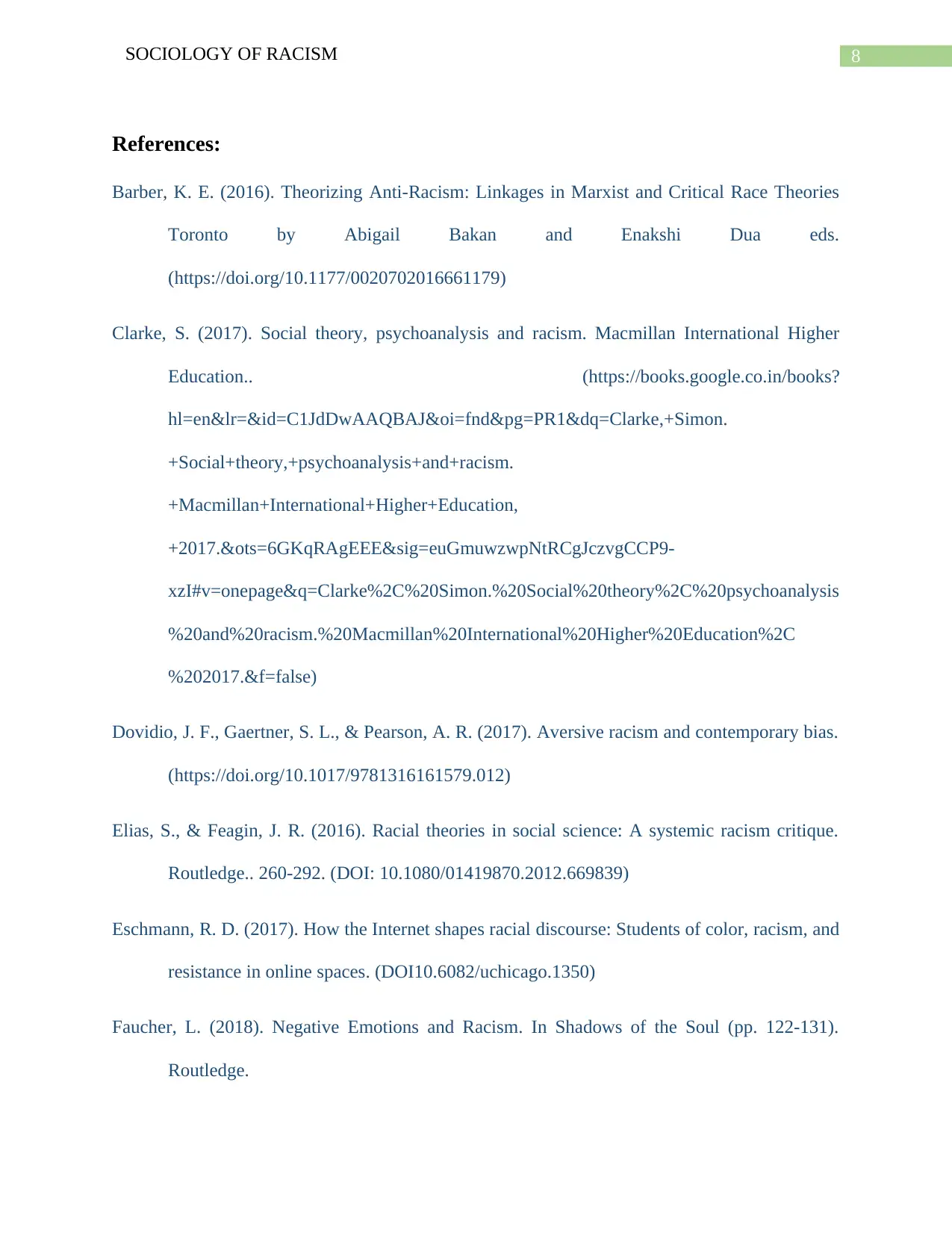
8SOCIOLOGY OF RACISM
References:
Barber, K. E. (2016). Theorizing Anti-Racism: Linkages in Marxist and Critical Race Theories
Toronto by Abigail Bakan and Enakshi Dua eds.
(https://doi.org/10.1177/0020702016661179)
Clarke, S. (2017). Social theory, psychoanalysis and racism. Macmillan International Higher
Education.. (https://books.google.co.in/books?
hl=en&lr=&id=C1JdDwAAQBAJ&oi=fnd&pg=PR1&dq=Clarke,+Simon.
+Social+theory,+psychoanalysis+and+racism.
+Macmillan+International+Higher+Education,
+2017.&ots=6GKqRAgEEE&sig=euGmuwzwpNtRCgJczvgCCP9-
xzI#v=onepage&q=Clarke%2C%20Simon.%20Social%20theory%2C%20psychoanalysis
%20and%20racism.%20Macmillan%20International%20Higher%20Education%2C
%202017.&f=false)
Dovidio, J. F., Gaertner, S. L., & Pearson, A. R. (2017). Aversive racism and contemporary bias.
(https://doi.org/10.1017/9781316161579.012)
Elias, S., & Feagin, J. R. (2016). Racial theories in social science: A systemic racism critique.
Routledge.. 260-292. (DOI: 10.1080/01419870.2012.669839)
Eschmann, R. D. (2017). How the Internet shapes racial discourse: Students of color, racism, and
resistance in online spaces. (DOI10.6082/uchicago.1350)
Faucher, L. (2018). Negative Emotions and Racism. In Shadows of the Soul (pp. 122-131).
Routledge.
References:
Barber, K. E. (2016). Theorizing Anti-Racism: Linkages in Marxist and Critical Race Theories
Toronto by Abigail Bakan and Enakshi Dua eds.
(https://doi.org/10.1177/0020702016661179)
Clarke, S. (2017). Social theory, psychoanalysis and racism. Macmillan International Higher
Education.. (https://books.google.co.in/books?
hl=en&lr=&id=C1JdDwAAQBAJ&oi=fnd&pg=PR1&dq=Clarke,+Simon.
+Social+theory,+psychoanalysis+and+racism.
+Macmillan+International+Higher+Education,
+2017.&ots=6GKqRAgEEE&sig=euGmuwzwpNtRCgJczvgCCP9-
xzI#v=onepage&q=Clarke%2C%20Simon.%20Social%20theory%2C%20psychoanalysis
%20and%20racism.%20Macmillan%20International%20Higher%20Education%2C
%202017.&f=false)
Dovidio, J. F., Gaertner, S. L., & Pearson, A. R. (2017). Aversive racism and contemporary bias.
(https://doi.org/10.1017/9781316161579.012)
Elias, S., & Feagin, J. R. (2016). Racial theories in social science: A systemic racism critique.
Routledge.. 260-292. (DOI: 10.1080/01419870.2012.669839)
Eschmann, R. D. (2017). How the Internet shapes racial discourse: Students of color, racism, and
resistance in online spaces. (DOI10.6082/uchicago.1350)
Faucher, L. (2018). Negative Emotions and Racism. In Shadows of the Soul (pp. 122-131).
Routledge.
⊘ This is a preview!⊘
Do you want full access?
Subscribe today to unlock all pages.

Trusted by 1+ million students worldwide
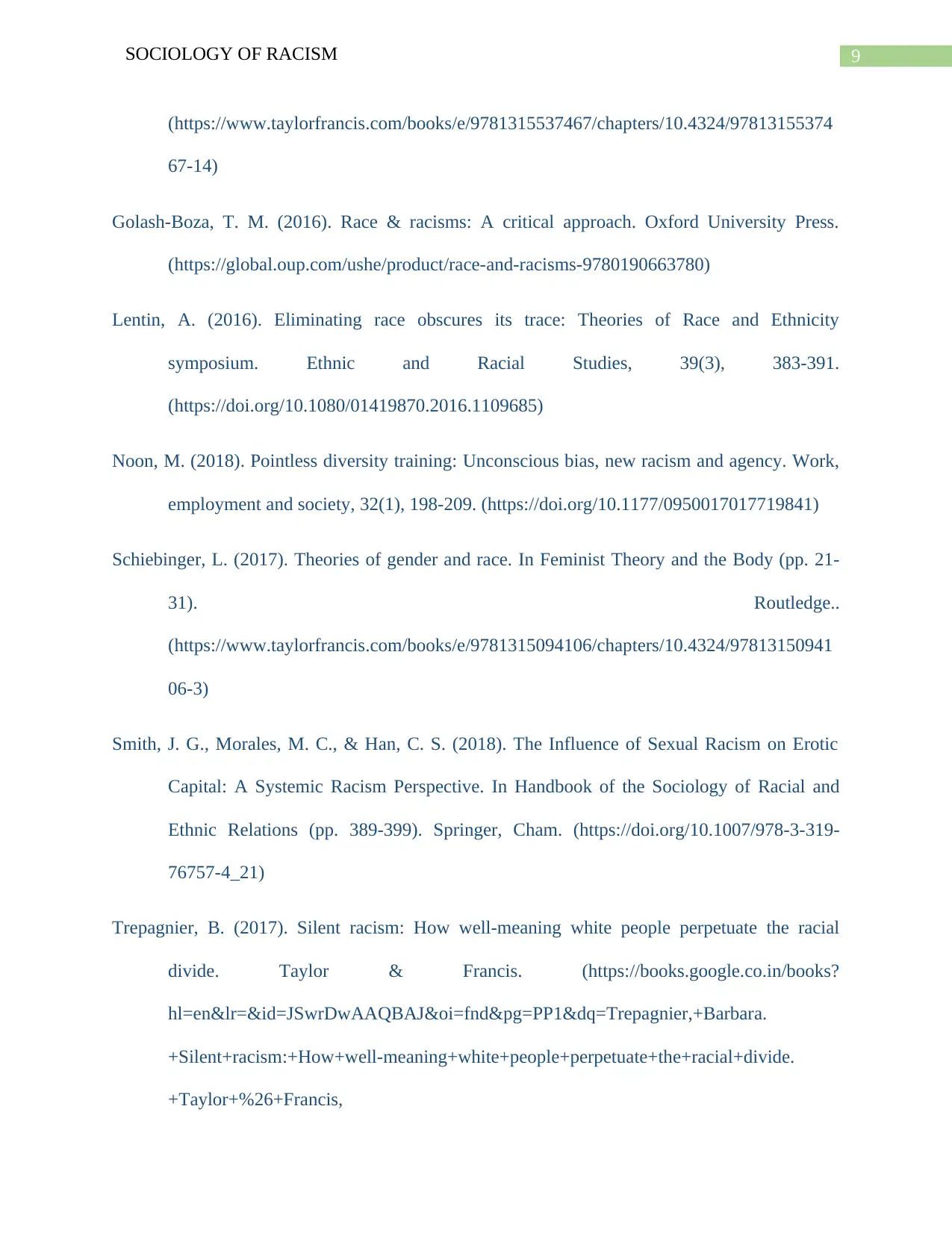
9SOCIOLOGY OF RACISM
(https://www.taylorfrancis.com/books/e/9781315537467/chapters/10.4324/97813155374
67-14)
Golash-Boza, T. M. (2016). Race & racisms: A critical approach. Oxford University Press.
(https://global.oup.com/ushe/product/race-and-racisms-9780190663780)
Lentin, A. (2016). Eliminating race obscures its trace: Theories of Race and Ethnicity
symposium. Ethnic and Racial Studies, 39(3), 383-391.
(https://doi.org/10.1080/01419870.2016.1109685)
Noon, M. (2018). Pointless diversity training: Unconscious bias, new racism and agency. Work,
employment and society, 32(1), 198-209. (https://doi.org/10.1177/0950017017719841)
Schiebinger, L. (2017). Theories of gender and race. In Feminist Theory and the Body (pp. 21-
31). Routledge..
(https://www.taylorfrancis.com/books/e/9781315094106/chapters/10.4324/97813150941
06-3)
Smith, J. G., Morales, M. C., & Han, C. S. (2018). The Influence of Sexual Racism on Erotic
Capital: A Systemic Racism Perspective. In Handbook of the Sociology of Racial and
Ethnic Relations (pp. 389-399). Springer, Cham. (https://doi.org/10.1007/978-3-319-
76757-4_21)
Trepagnier, B. (2017). Silent racism: How well-meaning white people perpetuate the racial
divide. Taylor & Francis. (https://books.google.co.in/books?
hl=en&lr=&id=JSwrDwAAQBAJ&oi=fnd&pg=PP1&dq=Trepagnier,+Barbara.
+Silent+racism:+How+well-meaning+white+people+perpetuate+the+racial+divide.
+Taylor+%26+Francis,
(https://www.taylorfrancis.com/books/e/9781315537467/chapters/10.4324/97813155374
67-14)
Golash-Boza, T. M. (2016). Race & racisms: A critical approach. Oxford University Press.
(https://global.oup.com/ushe/product/race-and-racisms-9780190663780)
Lentin, A. (2016). Eliminating race obscures its trace: Theories of Race and Ethnicity
symposium. Ethnic and Racial Studies, 39(3), 383-391.
(https://doi.org/10.1080/01419870.2016.1109685)
Noon, M. (2018). Pointless diversity training: Unconscious bias, new racism and agency. Work,
employment and society, 32(1), 198-209. (https://doi.org/10.1177/0950017017719841)
Schiebinger, L. (2017). Theories of gender and race. In Feminist Theory and the Body (pp. 21-
31). Routledge..
(https://www.taylorfrancis.com/books/e/9781315094106/chapters/10.4324/97813150941
06-3)
Smith, J. G., Morales, M. C., & Han, C. S. (2018). The Influence of Sexual Racism on Erotic
Capital: A Systemic Racism Perspective. In Handbook of the Sociology of Racial and
Ethnic Relations (pp. 389-399). Springer, Cham. (https://doi.org/10.1007/978-3-319-
76757-4_21)
Trepagnier, B. (2017). Silent racism: How well-meaning white people perpetuate the racial
divide. Taylor & Francis. (https://books.google.co.in/books?
hl=en&lr=&id=JSwrDwAAQBAJ&oi=fnd&pg=PP1&dq=Trepagnier,+Barbara.
+Silent+racism:+How+well-meaning+white+people+perpetuate+the+racial+divide.
+Taylor+%26+Francis,
Paraphrase This Document
Need a fresh take? Get an instant paraphrase of this document with our AI Paraphraser
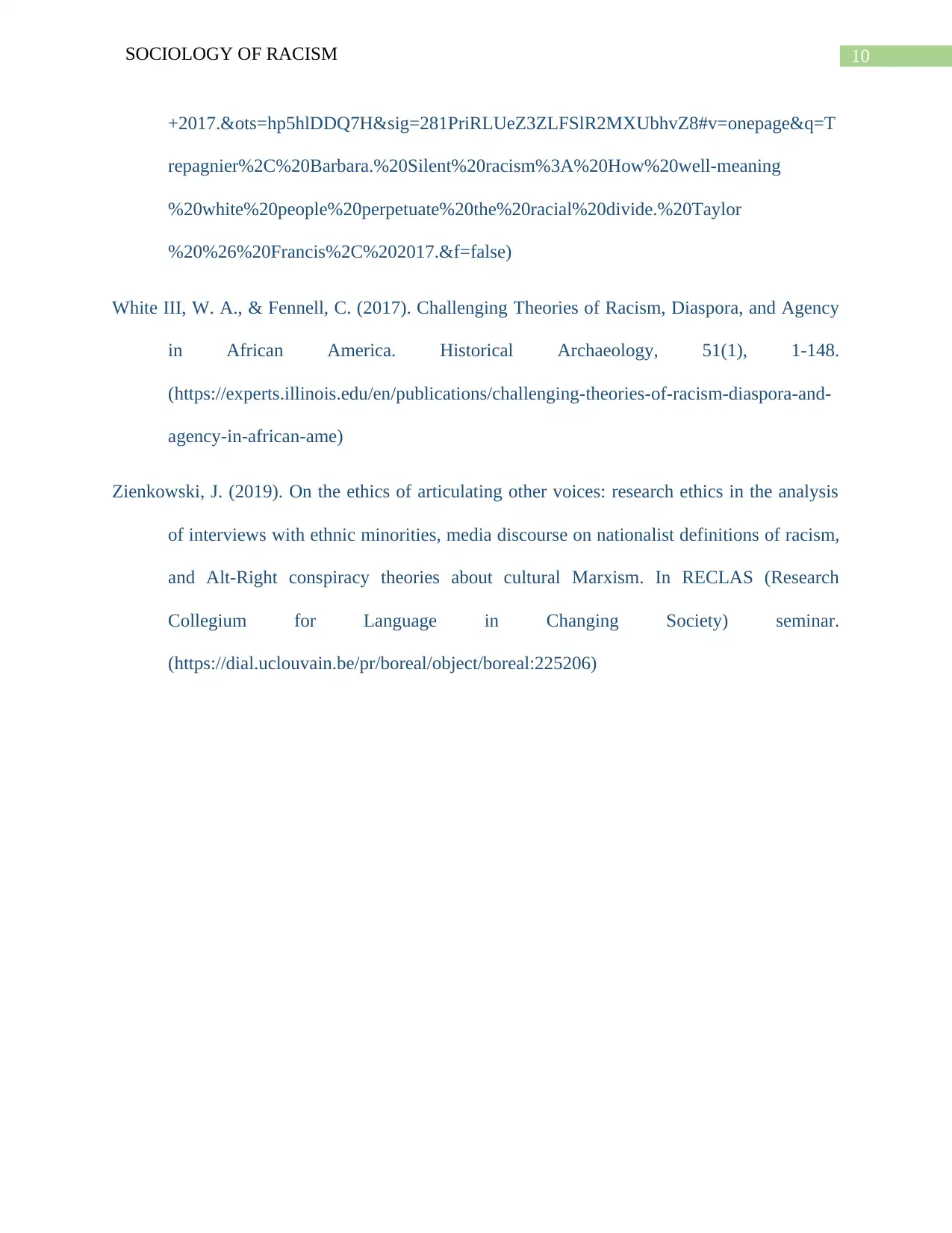
10SOCIOLOGY OF RACISM
+2017.&ots=hp5hlDDQ7H&sig=281PriRLUeZ3ZLFSlR2MXUbhvZ8#v=onepage&q=T
repagnier%2C%20Barbara.%20Silent%20racism%3A%20How%20well-meaning
%20white%20people%20perpetuate%20the%20racial%20divide.%20Taylor
%20%26%20Francis%2C%202017.&f=false)
White III, W. A., & Fennell, C. (2017). Challenging Theories of Racism, Diaspora, and Agency
in African America. Historical Archaeology, 51(1), 1-148.
(https://experts.illinois.edu/en/publications/challenging-theories-of-racism-diaspora-and-
agency-in-african-ame)
Zienkowski, J. (2019). On the ethics of articulating other voices: research ethics in the analysis
of interviews with ethnic minorities, media discourse on nationalist definitions of racism,
and Alt-Right conspiracy theories about cultural Marxism. In RECLAS (Research
Collegium for Language in Changing Society) seminar.
(https://dial.uclouvain.be/pr/boreal/object/boreal:225206)
+2017.&ots=hp5hlDDQ7H&sig=281PriRLUeZ3ZLFSlR2MXUbhvZ8#v=onepage&q=T
repagnier%2C%20Barbara.%20Silent%20racism%3A%20How%20well-meaning
%20white%20people%20perpetuate%20the%20racial%20divide.%20Taylor
%20%26%20Francis%2C%202017.&f=false)
White III, W. A., & Fennell, C. (2017). Challenging Theories of Racism, Diaspora, and Agency
in African America. Historical Archaeology, 51(1), 1-148.
(https://experts.illinois.edu/en/publications/challenging-theories-of-racism-diaspora-and-
agency-in-african-ame)
Zienkowski, J. (2019). On the ethics of articulating other voices: research ethics in the analysis
of interviews with ethnic minorities, media discourse on nationalist definitions of racism,
and Alt-Right conspiracy theories about cultural Marxism. In RECLAS (Research
Collegium for Language in Changing Society) seminar.
(https://dial.uclouvain.be/pr/boreal/object/boreal:225206)
1 out of 11
Related Documents
Your All-in-One AI-Powered Toolkit for Academic Success.
+13062052269
info@desklib.com
Available 24*7 on WhatsApp / Email
![[object Object]](/_next/static/media/star-bottom.7253800d.svg)
Unlock your academic potential
Copyright © 2020–2026 A2Z Services. All Rights Reserved. Developed and managed by ZUCOL.





